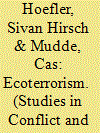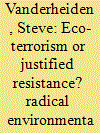| Srl | Item |
| 1 |
ID:
132880


|
|
|
|
|
| Publication |
2014.
|
| Summary/Abstract |
This article examines the phenomenon of "ecoterrorism" from a conceptual and empirical perspective. We explore the political and academic debates over the meaning and use of the term ecoterrorism, and assess the validity of the concept of "ecoterrorism" and of the alleged threat of the Radical Environmentalist and Animal Rights (REAR) movement by analyzing the characteristics of both the movement and its actions. Our analysis shows that the term ecoterrorism should only be used for a small proportion of the actions of REAR movement. Consequently, counterterrorist measures should only target these terrorist minorities, rather than all groups and the broader movement.
|
|
|
|
|
|
|
|
|
|
|
|
|
|
|
|
| 2 |
ID:
064862


|
|
|
| 3 |
ID:
188065


|
|
|
|
|
| Summary/Abstract |
Increasing levels of extreme weather patterns and environmental deterioration pose pertinent threats to the availability of essential resources, such as food and water. Past research has found a positive association between climate change and the likelihood of internal conflicts, especially in developing countries. We argue that intensifying climate events can lead to an increase in the spread and intensity of both left and right-wing ideologically motivated violence in developed countries as well, specifically the United States. We also focus on how regional environmental characteristics might be correlated to the geographical distribution of domestic political violence. Our findings suggest that while both far-right and environmental violence are more prevalent during warmer seasons and extreme warming weather events, such as heat waves, political and demographic factors also need to be considered. We also found a strong linkage between man-made ecological damage, as opposed to natural disasters, and the prevalence of eco-violence incidents, especially in states that have a progressive-liberal political culture and high levels of ecological exploitation. We conclude with a brief discussion of findings and suggestions for future research.
|
|
|
|
|
|
|
|
|
|
|
|
|
|
|
|
| 4 |
ID:
010722


|
|
|
|
|
| Publication |
Jan-march 1996.
|
| Description |
1-18
|
|
|
|
|
|
|
|
|
|
|
|
|
|
|
|